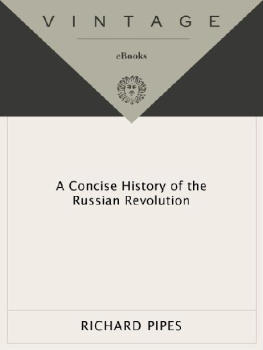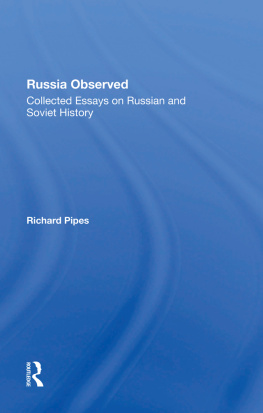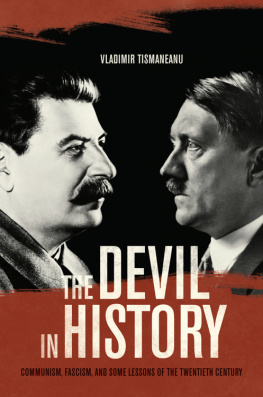Richard Pipes - Communism: A History
Here you can read online Richard Pipes - Communism: A History full text of the book (entire story) in english for free. Download pdf and epub, get meaning, cover and reviews about this ebook. year: 2003, publisher: Modern Library, genre: History. Description of the work, (preface) as well as reviews are available. Best literature library LitArk.com created for fans of good reading and offers a wide selection of genres:
Romance novel
Science fiction
Adventure
Detective
Science
History
Home and family
Prose
Art
Politics
Computer
Non-fiction
Religion
Business
Children
Humor
Choose a favorite category and find really read worthwhile books. Enjoy immersion in the world of imagination, feel the emotions of the characters or learn something new for yourself, make an fascinating discovery.

- Book:Communism: A History
- Author:
- Publisher:Modern Library
- Genre:
- Year:2003
- Rating:5 / 5
- Favourites:Add to favourites
- Your mark:
- 100
- 1
- 2
- 3
- 4
- 5
Communism: A History: summary, description and annotation
We offer to read an annotation, description, summary or preface (depends on what the author of the book "Communism: A History" wrote himself). If you haven't found the necessary information about the book — write in the comments, we will try to find it.
Communism: A History — read online for free the complete book (whole text) full work
Below is the text of the book, divided by pages. System saving the place of the last page read, allows you to conveniently read the book "Communism: A History" online for free, without having to search again every time where you left off. Put a bookmark, and you can go to the page where you finished reading at any time.
Font size:
Interval:
Bookmark:
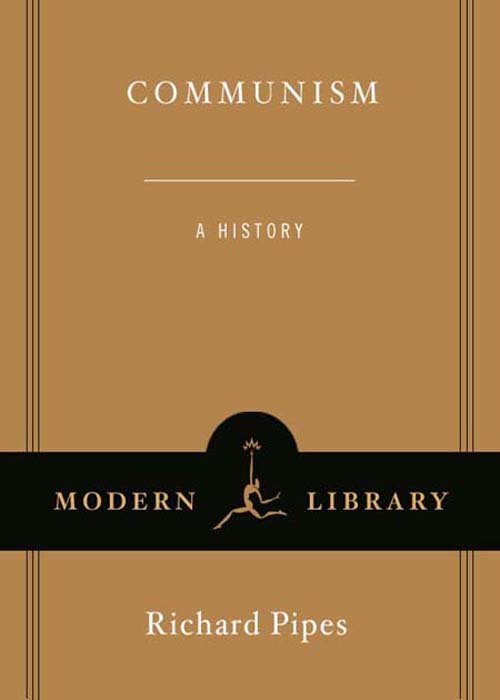
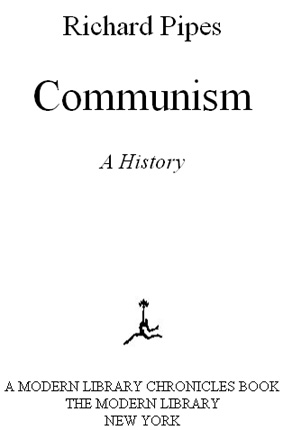
Contents
Historical antecedents; Marx and Engels; Failed expectations of Marxists; The Second International and its collapse
Russias revolutionary tradition; Lenin; 1917; Lenins dictatorship; Failure of War Communism"; Exporting revolution
Stalin takes charge; Industrialization and collectivization; The Great Terror; Stalin exploits Russian nationalism; Stalin as Lenins natural heir; World War II; Khrushchev; Decay and collapse
The Comintern; Western Communists and fellow travelers; Communism and Nazism; Stalins dual foreign policy; The Cold War; PostWorld War II Communism in the West
Common features; Comintern promotes alliances with nationalists; Mao and Maoism; Post-Stalinist Soviet policy in the Third World; Chinas Great Leap Forward and Cultural Revolution; Pol Pots Cambodia; Allendes Chile; Castros Cuba; Mengistus Ethiopia; Terrorism; Conclusions
Inherent contradictions of Communism as cause of its repeated failures; Role of ideology; The costs of Communism
The most encouraging thing about the Soviet rgime was its failure. If it had succeeded... I would have known that there were no limits to the extent to which human beings could be terrorised and enslaved.
Malcolm Muggeridge
Preface
This book is an introduction to Communism and, at the same time, its obituary. For it is quite certain that even if the quest for perfect social equality that had driven utopian communists since antiquity ever resumes, it will not take the form of Marxism-Leninism. The latters rout has been so complete that even post-Soviet Communists in Russia and elsewhere have abandoned it in favor of an eclectic social democratic platform laced with nationalism. We are, therefore, today able to draw up a balance sheet of a movement that dominated most of the twentieth century, to determine whether its failure was due to human error or to flaws inherent in its very nature.
The word communism, coined in Paris in the 1840s, refers to three related but distinct phenomena: an ideal, a program, and a regime set up to realize the ideal.
The ideal is one of full social equality that in its most extreme form (as in some of Platos writings) calls for the dissolution of the individual in the community. Inasmuch as social and economic inequalities derive primarily from inequalities of possession, its attainment requires that there be no mine and thinein other words, no private property. This ideal has an ancient heritage, reappearing time and again in the history of Western thought from the seventh century b.c. to the present.
The program dates back to the middle of the nineteenth century and is most closely associated with the names of Karl Marx and Friedrich Engels. In their Communist Manifesto of 1848 Marx and Engels wrote that the theory of the Communists may be summed up in a single sentence: Abolition of private property. Engels claimed that his friend had formulated a scientific theory that demonstrated the inevitable collapse of societies based on class distinctions.
Although throughout history there had been sporadic attempts to realize the communist ideal, the first determined effort to this effect by using the full power of the state occurred in Russia between 1917 and 1991. The founder of this regime, Vladimir Lenin, saw a propertyless and egalitarian society emerging from the dictatorship of the proletariat that would eliminate private property and pave the way for Communism.
We shall trace the history of Communism in this sequence both because it makes sense logically and because it is in this manner that it has evolved historically: first the idea, then the plan of realization, and finally the implementation. But we will concentrate on the implementation because the ideal and the program, taken by themselves, are relatively innocuous, whereas every attempt to put them into practice, especially if backed by the full power of the state, has had enormous consequences.
Communist
Theory
and
Program
The idea of a classless, fully egalitarian society first emerged in classical Greece. Ancient Greece happened to have been the first country in the world to recognize private property in land and to treat land as a commodity, and hence it was the first to confront the social inequalities that result from ownership. Hesiod, a contemporary of Homer (seventh century b.c.), in the poem Works and Days extolled a mythical Golden Age when people were not driven by the shameful lust for gain, when there was an abundance of goods for all to share and mankind lived in perpetual peace. The theme of the Golden Age resounded in the writings of the Roman poets Virgil and Ovid; Ovid spoke of the time when the world knew nothing of boundary posts and fences.
The ideal acquired its earliest theoretical formulation in the writings of Plato. In the Republic, speaking through Socrates, Plato saw the root of discord and wars in belongings:
Such differences commonly originate in a disagreement about the use of the terms mine and not mine, his and not his.... And is not that the best-ordered State in which the greatest number of persons apply the terms mine and not mine in the same way to the same thing?
In The Laws, Plato envisioned not only a society in which people shared all worldly possessions, as well as their wives and children, but one in which
the private and individual is altogether banished from life, and things which are by nature private, such as eyes and ears and hands, have become common, and in some way see and hear and act in common, and all men express praise and blame and feel joy and sorrow on the same occasions.
Aristotle, Platos pupil, questioned whether such a communist utopia would bring about social peace, on the grounds that people who hold things in common are more prone to quarrel than those who hold them in private ownership. Furthermore, he argued, the root of social discord lies not in material belongings but in the yearning for them: it is not possession but the desires of mankind which require to be equalized.
There exists a widespread but false notion that socialism and communism are merely up-to-date, secular versions of Christianity. As the nineteenth-century Russian philosopher Vladimir Soloviev has pointed out, the difference is that whereas Jesus urged his followers to give up their own possessions, the socialists and communists want to give away the possessions of others. Moreover, Jesus never insisted on penury; he merely counseled it as easing the way to salvation. Saint Pauls well-known saying about money is usually misquoted: he said not that money is the root of all evil but that love of money isin other words, greed. Saint Augustine asked rhetorically, Is gold not good? and answered, Yes, it is good. But the evil use good gold for evil, and the good use good gold for good.
The fathers of the church and later Catholic theologians took a pragmatic view of ownership. According to Saint Augustine, a propertyless world was possible only in paradisethat Golden Age which mankind had lost because of original sin. Given human imperfection, property is moral if used wisely and employed for charitable purposes. The Catholic Church not only did not preach poverty but disowned and sometimes persecuted those who did. The founders of Protestantism, notably Calvin, viewed wealth as a positive good and a sign of divine grace.
Next pageFont size:
Interval:
Bookmark:
Similar books «Communism: A History»
Look at similar books to Communism: A History. We have selected literature similar in name and meaning in the hope of providing readers with more options to find new, interesting, not yet read works.
Discussion, reviews of the book Communism: A History and just readers' own opinions. Leave your comments, write what you think about the work, its meaning or the main characters. Specify what exactly you liked and what you didn't like, and why you think so.


